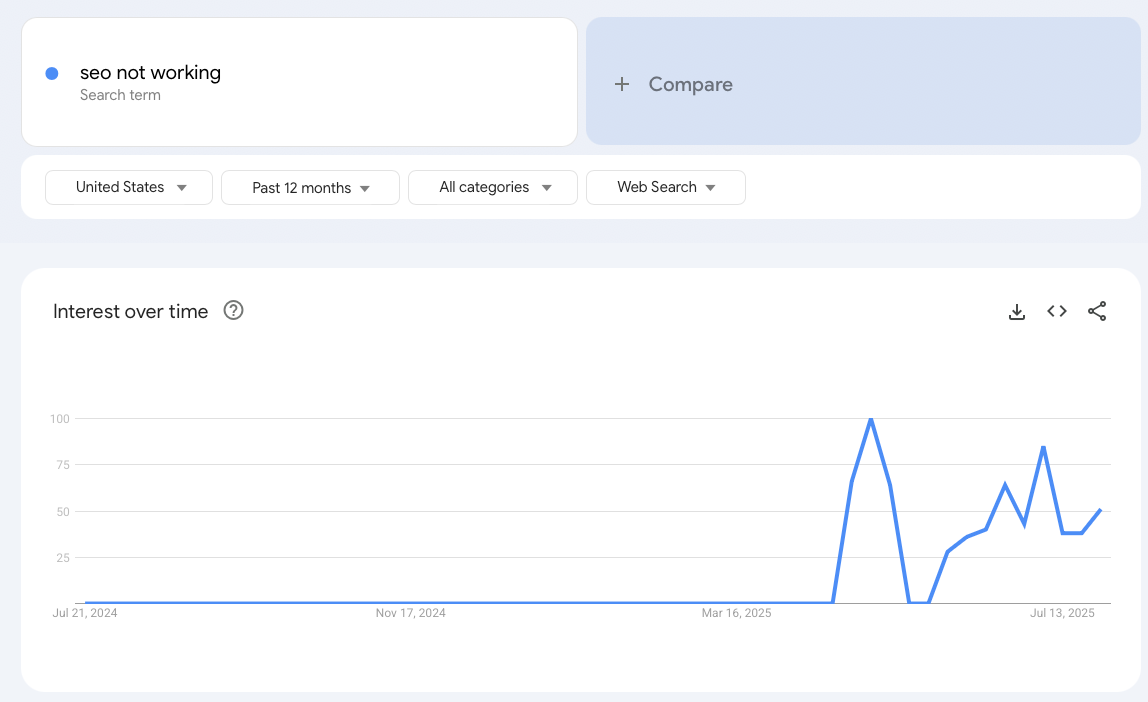Why Are People Searching, "SEO Not Working?"

It's peak mango season on O'ahu. If you walk around, you can smell it, not the sweetness of fruit waiting to be picked, but the sour, fermented drift of the ones that dropped and were never touched.
That's what digital marketing feels like right now. Something's in the air. People smell it. They just don't know what to call it.
You still hear people say, "performance is soft." They'll talk about how it's summer and it's always slower for web traffic, or how there was just another Google update last month. But you can tell it sits differently with them. There's a little extra hedge in their justifications. And they're probably getting emails with subject lines like "Pricing?" from strangers complimenting their website, then claiming it's not ready for "Answer Engine Optimization," "Generative Search Optimization," or "Language Model Optimization." Terms that didn't exist in their world six months ago.
None of those terms are industry standards. They might not ever be. It's a land rush. Everyone's trying to coin the phrase that sticks once AI browsers go mainstream and conversational search becomes normal, at least from the viewpoint of marketers.
On the consumer side, search interfaces are changing. Chatbots have replaced search bars. AI answers provide concise responses instead of a list of 10 blue links you have to sift through to find a roast chicken recipe that doesn't kick off with someone's origin story. Instagram posts and TikTok videos show up in "how to" searches where blogs used to dominate. And apparently, Siri's about to start saying things that actually matter.
This change in search is easy to miss. It's a complete rework of a search interface that hasn't changed much since the early 2000s. Consumers are being drip-fed these changes to maximize adoption and retention among emerging interfaces. Yet all the AI news focuses on jobs becoming obsolete, robots making cheeseburgers and pizza, and miracle medical cures. But business owners are already seeing this impact in their analytics and web traffic reports.
The platforms used for getting your business found and discovered online still exist, and some new ones have emerged. They're not going away. But the way these platforms discover information and present it to searchers is changing.
Google summarizes your content and serves up the answer without sending anyone to your site. It might even mix some of your competitor's content with yours to create the "best" answer. Your website will technically still be listed if a user clicks the link icon to check sources, but 58.5% of Google searches are zero-click searches now.
ChatGPT answers questions and follows up if you need more information. It will even surf the web for you so you never have to leave the chat box. TikTok, Instagram, and YouTube videos are showing up in search results too, often below AI answer summaries.
All of these platforms are making judgment calls about your intent and trying to provide the best answer possible. Your content may be perfect for informational searches but not commercial ones. That's an AI judgment call happening across Google, Perplexity, ChatGPT, and the same AI functionality running underneath Instagram, TikTok, and Facebook.
This is what's called retrieval-layer behavior. Unlike past algorithm changes that just reordered the same ten blue links, AI systems are now discovering your content in one process and presenting it in a completely different format. Discovery and presentation have split apart.
In the old model, being found meant being clicked. Now, being found means being rephrased, reinterpreted, repurposed, and sometimes, misrepresented.
That's why your analytics look weird. The old metrics were built for a world where visibility meant traffic.
Yeah, Google and Facebook make changes all the time. ChatGPT is going to take all the jobs. And Perplexity has a browser that costs $200.
These aren't just headlines. They're interface changes happening quietly but quickly, testing which format users will engage with most. Google is changing its interface. ChatGPT is getting smarter quarterly, if not faster, and is supposedly releasing a web browser too. Perplexity is releasing the browser to its $200 tier users for now. A broader release is planned.
And the canary in the coal mine is your website, and my Google Search Console showing that my website is getting traffic from terms like "SEO not working," "answer engine optimization," and "generative engine optimization." Business owners are noticing something. They know it's not just another Google update or Instagram tweak. They're trying to self-diagnose by searching.
Organic Traffic Changed & Businesses Started Noticing
In 2017, a SpaceX rocket launch caused Los Angeles residents to panic because they thought it was an alien invasion. The rocket exhaust had left an unfamiliar trail in the sky. The fire department had to issue a statement confirming it was just a rocket launch.
That's what we're seeing now with search analytics. Many business owners don't closely track search changes—they either have an agency handling it or it's a monthly task. But when they look at their reports, something looks off. And like those LA residents, they're searching for explanations.
Yes, there was a Google update in June. ChatGPT released ChatGPT Search last Halloween, and Google AI summaries now reduce outbound clicks by as much as 58%. Business owners want to know how all these changes are affecting their web traffic. They can see it happening, and it's not like anything they've seen before.
Take a software company that reached out after a product release. They'd been following content strategies that should have increased traffic as search interfaces changed. Traffic was down, but sales were actually up slightly. The analytics showed Google traffic was "just off," but nothing was replacing it in the data. What they couldn't see was how Google's AI Overviews were summarizing their product information directly in search results. Users were getting answers without clicking through, but still converting through other touchpoints.
Or consider a popular local snack spot that always ranked well in Google searches. Suddenly they were getting "like 5,000 more" Instagram DMs but fewer website visits. The reason? Instagram content had started appearing directly in Google search results. Their reels and posts were now showing up alongside traditional web results, creating a new pathway that bypassed their website entirely.
A local boutique hotel got an alert from Google Search Console that a page was getting 5,000% more impressions than usual. Impressions, not clicks. Their write-up on Waikiki murals was being cited in AI answer summaries. Great for brand awareness, terrible for bookings. The content was perfect for answering "what to see in Waikiki" but useless for "where to stay in Waikiki." That's the nuance of answer engines: being cited doesn't always mean being discovered by the right audience.
If you're a business owner or marketer who felt something shift this summer but couldn't quite explain it, that's why. The interfaces are changing. They're fluid now, and a lot of smart people are trying to catch up without admitting they've already been left behind.
What Do You Call a Change in Search That's Not Just a Google Algorithm Update—It's a Whole Interface Update?
The best indicator that something is off is when an industry notices and starts giving something a name. Digital marketing agencies, SEO companies, and consultants all agree that AI has changed the search landscape and that AI-mediated search is the future. However, the real indicator of scale is the debate over which term or combination of terms to use for getting your business mentioned when AI answers questions.
Some call it Answer Engine Optimization. Others are betting on terms like Generative Engine Optimization or Language Model Optimization. There are at least five other variants floating around—AIO, GAIO, CEO, GSEO, MEO—but no one agrees on the label, which tells you everything you need to know. This is still forming.
Many practitioners insist it's still just SEO, just that SEO now means something completely different than it did two years ago. The lack of settled terminology signals we're still early in this shift. When an industry can't agree on what to call something, it usually means the thing itself is still changing too fast to pin down.
It's clear that AI is rewriting how search works. And these interfaces keep changing as AI gets smarter. People on both sides are starting to notice. Business owners are searching for better solutions, and agencies and consultants are doing a couple of different things.
Like SEO, AI Optimization Is Still Rented Ground
But here's what most businesses are getting wrong: they're optimizing for AI interfaces they don't control instead of building something AI systems can't ignore.
The rush to "optimize for ChatGPT" or "rank in AI Overviews" misses the bigger picture. These systems are black boxes that change constantly. Google's AI Overviews work differently today than they did six months ago. ChatGPT's web browsing gets updated regularly. Perplexity's algorithms are proprietary and shifting.
You're essentially building your business strategy around rented land that can change the rules overnight. The real danger isn't being invisible to AI—it's becoming completely dependent on AI systems you don't control.
The smarter play? Become the source that AI systems can't help but cite. Build authority, expertise, and content quality that works regardless of which interface is trending. Because while the interfaces change, the need for authoritative information stays constant.
What Are Business Owners Doing About SEO Now?
Business owners and marketers sensed something was wrong before the metrics proved it. They searched for help before the language was settled. They brought questions to the table that agencies couldn't yet answer, and they stuck around anyway—not because they were looking for certainty, but because they were looking for direction. And Google Search Console and Google Trends picked up the leading indicators:

That's the difference business owners are navigating now. In markets shaped by AI systems that cite, rewrite, and reinterpret everything they see, the winners aren't just optimizing content. They're optimizing presence. And that presence is arguably part of traditional SEO, but simply ranking doesn't factor in how AI interprets them.
While the industry might not have settled on the right words for what they're doing, savvy business owners decided to leave that debate in the forums and on X and Reddit. Because while others were waiting for best practices or gurus or to be right, smart business owners and agencies stopped waiting for instructions and started experimenting in public.
Business owners are searching "SEO not working" because they can feel the ground shifting beneath their marketing strategies. The smart ones aren't waiting for someone else to name what's happening. They're building authority that works regardless of which interface dominates next year.


Member discussion